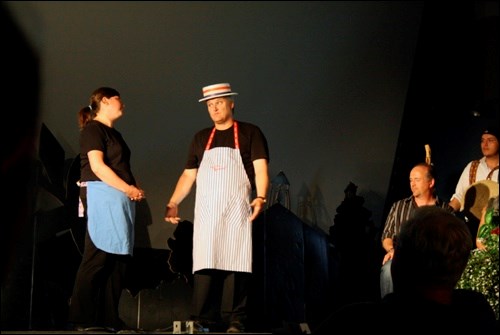In February 2010, two ladies, Germaine Vany and Noreen Foisy, came together and decided that, with Cut Knife nearing it's 100th birthday in 2012, they had to do something to celebrate Cut Knife.
They set up the Cut Knife Centennial Celebration Committee and started planning what became a successful celebration weekend June 30 and July 1.
About a year ago, Vany phoned people and said that she was looking for someone to get involved in doing a play about Cut Knife. Audrey Waters and Val Laing took the tremendous job of producing the play. They looked for someone who could write a play for them, and, quite by accident, came across a professional playwright, David E. Bonk from Montreal, who was visiting relatives in Cut Knife. He told them he was interested in writing the play. In doing so, he decided that it would be best to do it decade by decade, seeing that Cut Knife had a very "colourful" 100 years of existence!
Bonk was born to Jean and Walter Bonk. His grandparents, Isadore and Emilia Paron, along with David's numerous uncles, aunts and cousins were the inspiration to the writing of this play. He spent many summers visiting in the Cut Knife/Baldwinton/Atton's Lake areas while he lived in Ontario, British Columbia and Regina.
His interest in theatre was sparked when his parents took him to The Trial of Louis Riel. His first taste of fame came in high school when he played the king in the Ugly Duckling. He graduated with honours in a Bachelor of Arts degree.
Bonk has been a stage manager, actor, musician, and director. He has written over 18 plays, two monologues and a musical. His plays have been used in workshops, staged readings and screen plays and they have been chosen for numerous productions in Montreal. His most recent writing is the centennial play, Celebrating Cut Knife!
The people in Cut Knife who helped him with the research, had fun doing interviews with a many people. They came across information about the formation of the town in 1912, and the very first businesses that was set up in town. By the end of October, the research was done, and the story was left with Bonk over the winter.
With only four main characters in mind, Bonk started to write, and looking back in time, incorporated events such as the depression of the 1930s, the Second World War, the winter storm that left a teacher and her students stranded in the school for a couple of days and the tornado of the 1980s that went through the town, to name a few. The story evolved with only the four main characters, to a play with 13 characters. The cast was eventually expanded 28 players.
By spring, Waters and Laing started to look for actors, and some of those were students who showed an interest in the play. The rest of the cast included community members. The set was build by community members as well. Everyone volunteered to do something.
At the rehearsal on Friday night, it was decided to open the dress rehearsal Saturday night to the seniors, because large crowds were anticipated for the two performances Sunday. The first performance was at 2 p.m., and the second at 7 p.m., andboth shows saw full houses. It was evident that not only the actors, but the audience as well, enjoyed the play.
Spirit Father and Mother Nature, played by Jordan Weenie and Barb Tootoosis, stopped two City Slickers, played by Ian Switzer and Gisele Brackenbury, in their tracks while they were driving through Saskatchewan complaining aboutthe "nothingness" they have to endure in this province. Spirit Father and Mother Nature let the City Slickers see how Cut Knife became a town and then incorporated in the provinceof Saskatchewan. They joked about the town of Baldwinton, or "Bald"-winton when the City Slicker woman cracked a joke about her husband's lack of hair. However, the were silenced by Spirit Father and Mother Nature, who told them to watch and learn about the history of Cut Knife.
Throughout the play a slide-show with photos of the town over the 100 years were shown. It made the events that happened much more real to everyone and made memories came alive. Bonk incorporated all the hardships that were endured so realistically, one could feel the sorrow of the men and boys leaving to go to war.
Finally, the City Slickers' eyes opened and they saw what a wonderful town Cut Knife is, and that they will be living in a great province if they move to Saskatchewan. And naturally, the town of Cut Knife will be the best town for them to live in.
Cut Knife has an interesting past, and Bonk's expertise in telling this unique story is evident throughout the play. In Bonk's own words: "The play was not a documentary, so everything that you saw on stage happened exactly as is. Lots and lots of research was done, and from that research I created what I thought would be a fun way to revisit, see the history of Cut Knife."



